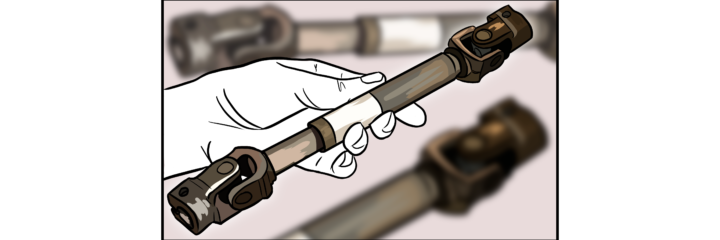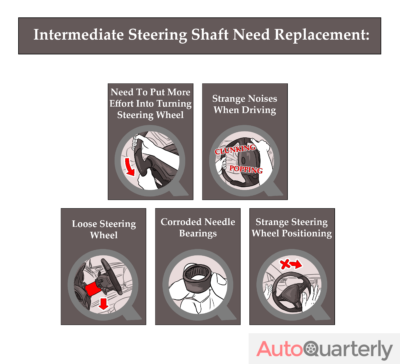An essential part of your car’s steering system, the intermediate steering shaft is responsible for connecting your steering wheel to the gearbox. It can be difficult or impossible to safely drive your car without this part functioning, so if you suspect that you need your intermediate steering shaft replaced you should consult with a professional as soon as possible.
Below, we will be discussing several symptoms that may indicate your intermediate steering shaft is in need of replacement. Then, we will be giving you information on how to replace your intermediate steering shaft and an estimate for the cost of having this repair professionally completed so you can make a fully informed decision about your car’s needs.
Why Is the Intermediate Steering Shaft Important?
The intermediate steering shaft is the part of your car’s steering system and connects your steering wheel to the steering gearbox. It extends through the front end of the car and has a universal joint on both sides of it; these joints connect the steering shaft to the steering wheel and the steering gearbox respectively.
The shape of the universal joints allows you to turn the steering wheel smoothly and for the motion to be translated to movement in the wheels of your car. More information on how your steering system functions can be found here.
Without the intermediate steering shaft in good condition, it will become difficult or even impossible for you to control your car. You may lose the ability to steer properly, turn, navigate roads, or will experience difficulty in handling the steering wheel.
If you suspect that you have a damaged intermediate steering shaft, it’s important to address the issue as quickly as possible to avoid the problem worsening and causing an accident.
What Causes an Intermediate Steering Shaft to Fail?
In general, the intermediate steering shaft is designed to last the lifetime of your car. However, older cars and cars with high mileage are prone to experience a failure in the steering shaft. More often than not this failure is caused by corroded needle bearings (we talk about this more in detail below) or by the universal joints that connect the intermediate steering shaft on each side experiencing general wear and tear.
Signs That Your Intermediate Steering Shaft Need Replacement
The below symptoms can indicate that your intermediate steering shaft is in need of replacement or repair.
Turning Difficulties
Problems turning your vehicle or navigating around corners are likely caused by an issue with your steering shaft. This can be an especially dangerous issue because you will need to put more effort into turning your wheel which can easily cause you to swerve or veer off the road, creating an accident.
You may also notice that the steering wheel is becoming difficult to handle or maneuver and that it doesn’t turn as smoothly as it does before or it feels like it is getting stuck. This can create problems turning, steering, and controlling your vehicle.
Strange Noises When Driving
Strange noises that happen when you drive your car and, most notably, when you attempt to turn your car can indicate a problem with the steering shaft. This is because a broken universal joint or other internal damages may cause the components of your steering system to grind against each other, creating noise.
You may notice a quiet clunking or popping sound at first, but this noise will likely increase over time and appear with other symptoms, such as a loose steering wheel or trouble turning. If possible, get your car evaluated by a professional at the first hint of unexplained noise.
Loose Steering Wheel
Most modern cars allow you to adjust the angle and tilt of your steering wheel to your specific preferences. If you find that you can no longer do this or that, once adjusted, the steering wheel is loose and falls back out of place, you may have a bad steering shaft that is unable to hold your wheel locked at a certain angle.
Corroded Needle Bearings
The needle bearings on your steering shaft are typically sealed, removing the need for them to be greased regularly and preventing rust or corrosion. When your steering shaft starts to experience wear and tear or the seals are ruined, the grease that is sealed inside on the needle bearings can dry up, resulting in loud clunking noises, rusting, and corrosion.
It may be possible to locate the needle bearings and regrease them, but this depends on the type of car you have. More often than not you will need a professional to help you fully evaluate and diagnose an issue with your car’s needle bearings.
Strange Steering Wheel Positioning
In general, steering wheels in modern cars are set to return back to the middle position once you take your hands off of them. If you notice that your steering wheel does not return back to a neutral middle position or frequently becomes stuck at strange angles after driving your car, you may have an issue with the intermediate steering shaft and be on the way to losing full control over your steering wheel.
Replacing Your Intermediate Steering Shaft
If you suspect that your intermediate steering shaft is faulty, it is very important that you take your car to a professional to get the issue fully diagnosed and corrected. This usually isn’t too complex of a replacement, but the mechanic may have to take parts out of your car to access the steering shaft depending on the make and model of your vehicle.
Other parts of the steering system may need to be replaced at the same time depending on what caused the failure of the steering shaft, and you will need a refill of power steering fluid to complete the repair.
It is important to note that the entire intermediate steering shaft will need to be replaced if one component of it is faulty as you cannot repair smaller parts. This can be annoying, but it does ensure that the replacement will completely take care of the issue as a brand new part is unlikely to fail.
Can You Replace Your Intermediate Steering Shaft at Home?
It is possible to replace your intermediate steering shaft at home, but you may not want to undertake this project unless you have prior experience with repairing cars. It is not a terribly complex repair, but completing it incorrectly may result in a risk of an accident if your steering system is not left in working order.
If you want to replace the intermediate steering shaft yourself, you can follow this tutorial. Keep in mind that steering shaft replacement techniques vary on the make and model of your car, so if you are confused at any point in the process or need pointers on which parts to purchase, make sure to consult with a local professional for extra help.
Average Replacement Cost of an Intermediate Steering Shaft
Depending on your car’s make and model, you could pay between $100 and $200 for the parts to replace the intermediate steering shaft. Labor costs an extra $80 to $200 an hour on average, and you will likely need at least an hour of labor to completely replace this part. This means the total average cost will be anywhere between $180 and $400.
You should keep in mind that your replacement cost may be higher depending on what needs to be taken out of your car to access the steering shaft, increasing labor costs. You may also end up paying higher replacement costs (in terms of both labor and prices) when visiting a dealership for the replacement as opposed to consulting a local mechanic.
Should You Drive With a Bad Intermediate Steering Shaft?
While you may find that you can drive with a bad intermediate steering shaft, this is not recommended. The extra effort that you will need to use in turning corners and maneuvering your car can put you at risk of losing control and there is a chance that the issue will escalate as you keep driving your car, eventually resulting in a complete failure of your steering system.
The best option if you suspect a faulty steering shaft is to get the issue looked at by a professional as soon as possible and either fixed professionally or with a DIY job.
Maintaining Your Car’s Safety
The intermediate steering shaft is an essential part of your vehicle’s steering system and problems with it may cause significant safety issues when it comes to controlling your car. If you suspect that you may be experiencing a faulty steering shaft, consult with the symptoms on our list to narrow down the culprit and consider taking your car to a professional as soon as possible to get the issue properly diagnosed and fixed.
Once your intermediate steering shaft is replaced, you will be able to get back to driving your car both safely and smoothly.



